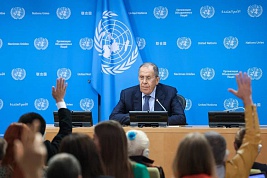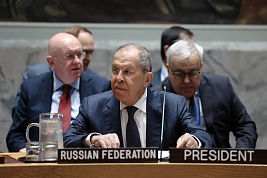Acting Foreign Minister Sergey Lavrov’s remarks at the 34th meeting of the Foreign Ministry’s Council of the Heads of Constituent Entities of the Russian Federation, Moscow, January 21, 2020
Colleagues,
We have convened for a regular meeting of the Foreign Ministry’s Council of the Heads of Constituent Entities of the Russian Federation.
Last quarter, we met to discuss the development of interregional cooperation and interregional forums and conferences. Work in this sphere has proceeded energetically with due regard for the recommendations adopted at the meeting and subsequently approved by President of Russia Vladimir Putin.
In some cases, the format of interregional meetings provides for the personal attendance by the heads of state. This is proof of the attention our work is being given at the top level. The range of subjects we address is expanding and includes now not only trade and the economy, which is what we began with, but also culture, humanitarian matters, education and sports, as well as events held to promote people-to-people contacts. Allocations for holding such events are increasing, including from the federal budget.
Our interaction includes efforts to further expand the geography of our cooperation. Proposals on establishing interregional platforms are being discussed by our colleagues in Iran, Greece and India. This spring, we are planning to hold a large-scale meeting of representatives of Russian and Moldovan regions. Agreements have been reached to hold a Russian-French year of interregional cooperation in 2020. Similar events were held recently with our German colleagues.
We can report positive achievements in the sphere of international associations. The EAEU plans include economic events to be attended by representatives from the member states’ regions. A Forum of the Heads of Regions of the SCO member states is being established at Russia’s initiative and in accordance with the Plan of Events for Russia’s SCO presidency approved by President Putin. The first meeting of the new forum is scheduled to take place in May this year.
The involvement of Russian regions in the activities of interregional platforms meets their development plans and helps to promote a positive international agenda. We will continue to cooperate with and provide all-round support to the constituent entities of the Russian Federation.
Today we will be discussing inter-municipal cooperation, which is not unlike interregional cooperation. The development of inter-municipal cooperation is having a positive effect on trade and tourism and is promoting research, educational and cultural relations and people-to-people ties.
Good results have been achieved in this sphere of late. Last year, Ryazan hosted the first Russia-China Municipal Forum, which was attended by 70 Chinese delegates and over 80 Russian representatives. Sister relations have been established between 44 municipal and administrative territories in Russia and South Korea, plus 26 Russian and 32 Japanese municipalities are involved in the Russia-Japan inter-municipal cooperation.
The first Russian-US Municipal Forum was held in Moscow in October 2019. I would like to note that the annual Fort Ross Dialogue on US-Russian Relations, which has been held for many years, is attended by representatives of municipal authorities as well. Also, a US-Russia Mayors’ Summit was held two years ago.
Inter-municipal ties are being developed with European partners, including between sister-cities. For example, relations are maintained between some 150 pairs of urban and municipal entities in Russia and Finland. Preparations are underway for a regular conference of Russian and Finnish sister-cities and municipalities, which is scheduled to take place in the Tver Region in June.
Inter-municipal ties are growing stronger between Russia and Germany (I mentioned interregional ties before). A Twin-City Partnership Meeting between Russia and Germany was held in Dueren last year.
Last year, Russia’s Twin Cities International Association (TCIA) signed a memorandum on cooperation with the Association of Towns and Communities of Slovakia.
The joint Russian-EU programmes of cross-border cooperation include multifaceted projects involving the municipal authorities of Estonia, Latvia, Lithuania and Poland. The work of our representatives at the Council of Europe’s Congress of Local and Regional Authorities offers opportunities for strengthening ties with foreign partners.
Naturally, our attention is focused on the Commonwealth of Independent States (CIS). Of course, we would like to see a more dynamic development of existing and the establishment of new ties between the municipalities of the Republic of Crimea and foreign partners. With this aim in view, we will continue to use the opportunities of the International Humanitarian Livadia Forum and the Yalta International Economic Forum.
Overall, we believe that inter-municipal cooperation has good potential. I am referring, in particular, to the BRICS Friendship Cities and Local Governments Cooperation Forum and the initiative on establishing a non-governmental Secretariat of Sister-Cities and Municipalities of the Caspian Region.
There are many topics we need to discuss. Let us hope that today we will be able to map out our future progress in this sphere.
Of course, we also believe that we should review the legal framework of the international activities of Russian municipalities, including in the context of debates on the improvement of public authorities. I hope that ultimately we will enhance the standing of municipalities, including in international affairs.
It is obvious that this objective cannot be achieved without resource, expert and administrative support. We will promote initiatives that provide for holding seminars and preparing recommended practices for local governments. We should probably use the ongoing discussions on improving the bodies of public authority to consider incorporating inter-municipal cooperation into a federal targeted programme so as to ensure sustainable financing for it.
In general, I believe that a seamless coordination of the efforts of the Russian Foreign Ministry, the Federal Agency for the Commonwealth of Independent States, Compatriots Living Abroad, and International Cultural Cooperation (Rossotrudnichestvo), the Russian Justice Ministry and other federal bodies of executive authority, as well as the regional authorities and Russian NGOs is especially important at this stage.


